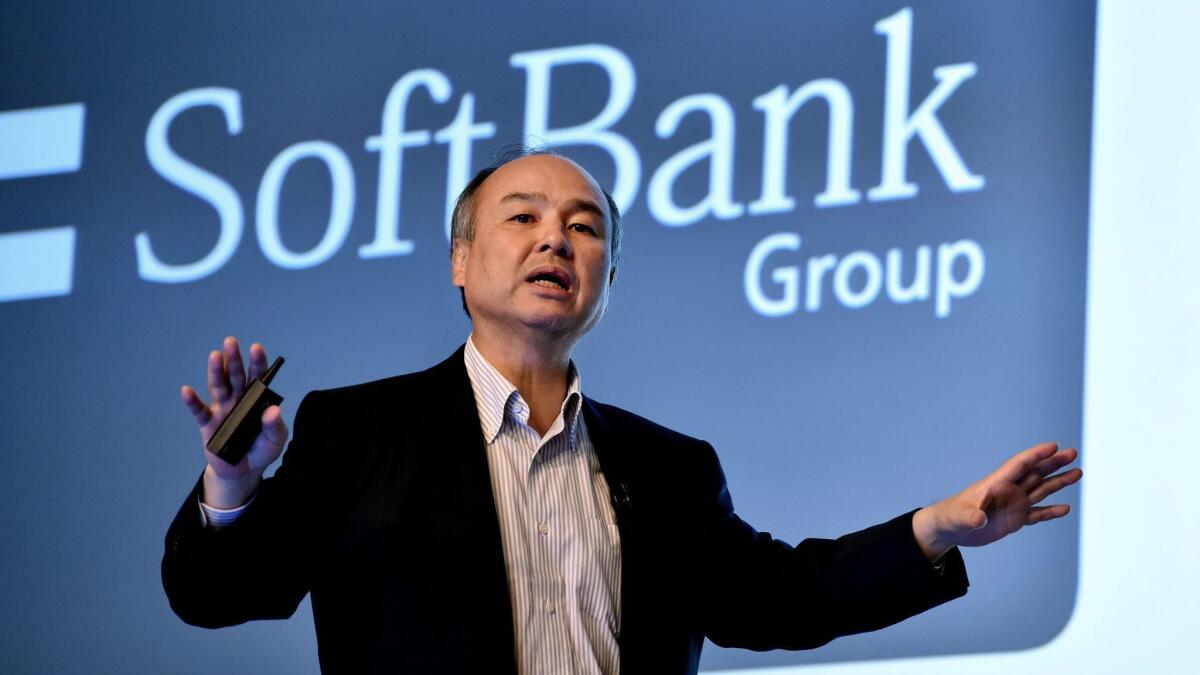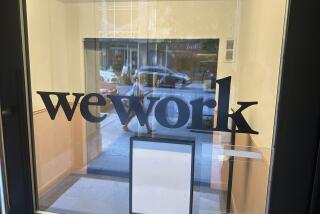Commentary: SoftBank Vision Fund shies away from WeWork. Alarm bells are ringing

- Share via
The tech bubble’s financial backer of last resort, the $100-billion SoftBank Vision Fund, seems to be having second thoughts about its role as booster-in-chief of very expensive and very unprofitable start-ups. That’s healthy for the fund. But it must be troubling for the various companies and industries that were relying on its largess — not least the real-estate sector.
The bridge too far appears to be WeWork Cos., the fast-growing $20-billion shared-office-space provider that masquerades as a “physical social network.” SoftBank Group Corp. founder Masayoshi Son and his backers in the Gulf region had been expected to splurge $15 billion to $20 billion on a majority stake in WeWork, but instead, the investment ended up being a more miserly $2 billion and was made by SoftBank alone. The Vision Fund, a kind of gargantuan private equity shop run by Son and SoftBank, did not take part.
The plaid-clad entrepreneurs who populate WeWork’s offices haven’t suddenly lost all their appeal for the big-money crowd; $2 billion is still a princely sum. SoftBank has already poured $4.4 billion into WeWork alongside the Vision Fund. Taking into account other commitments from the Japanese company, including convertible debt, warrants and the latest $2 billion, the total comes to more than $10 billion.
Still, the fact that SoftBank’s shares rose almost 6% because of the much smaller new investment shows investors are mightily relieved about Son’s sudden bout of prudence. Understandably so, given the recent gyrations in the markets and the tech industry in particular. And while WeWork’s valuation appears unhurt, there are plenty of other alarm bells ringing around the New York-based start-up.
The Vision Fund’s investment model depends on deploying huge amounts of cash to companies that are growing extremely quickly. WeWork no longer seems to fit the bill, and that should worry people. This is a firm whose valuation only really makes sense if it grows at double-digit rates for years to come, while managing to maintain its rental prices even if the era of cheap financing comes to a halt.
The Gulf investors backing the Vision Fund seem to have decided that WeWork — which on Tuesday rebranded itself as “the We Company” — is not a tech bet but simply an aggressive punt on real estate. They “have told SoftBank executives they would prefer the fund stick to technology bets,” according to the Wall Street Journal. That’s got to hurt.
There’s another way too, beyond SoftBank’s valuation, of looking at how the market judges WeWork’s prospects. The office space provider issued a seven-year unsecured high-yield bond last April, which has since dropped 14% in value and is doing worse than the broader high-yield index. Given WeWork’s opaque financials and its self-made metrics such as “community-adjusted Ebitda” — the accounting acronym for earnings before interest, taxes, depreciation and amortization — you can see why investors might be rethinking a company that has relied a lot on confidence, optimism and faith.
While there’s no doubt a sober message here for Silicon Valley optimists, there’s also one for markets at large. This might be a turning point not too dissimilar to past real-estate bubbles. In 2007, Blackstone splashed $39 billion on a portfolio of commercial property including debt, only to begin selling off assets soon after. Lehman Bros.’ forays into real estate didn’t go so well. With WeWork already occupying swaths of our big cities, it’s hard to see how its ambitions get dented without more far-reaching consequences.
Laurent and Ashworth write for Bloomberg Opinion.
More to Read
Inside the business of entertainment
The Wide Shot brings you news, analysis and insights on everything from streaming wars to production — and what it all means for the future.
You may occasionally receive promotional content from the Los Angeles Times.










